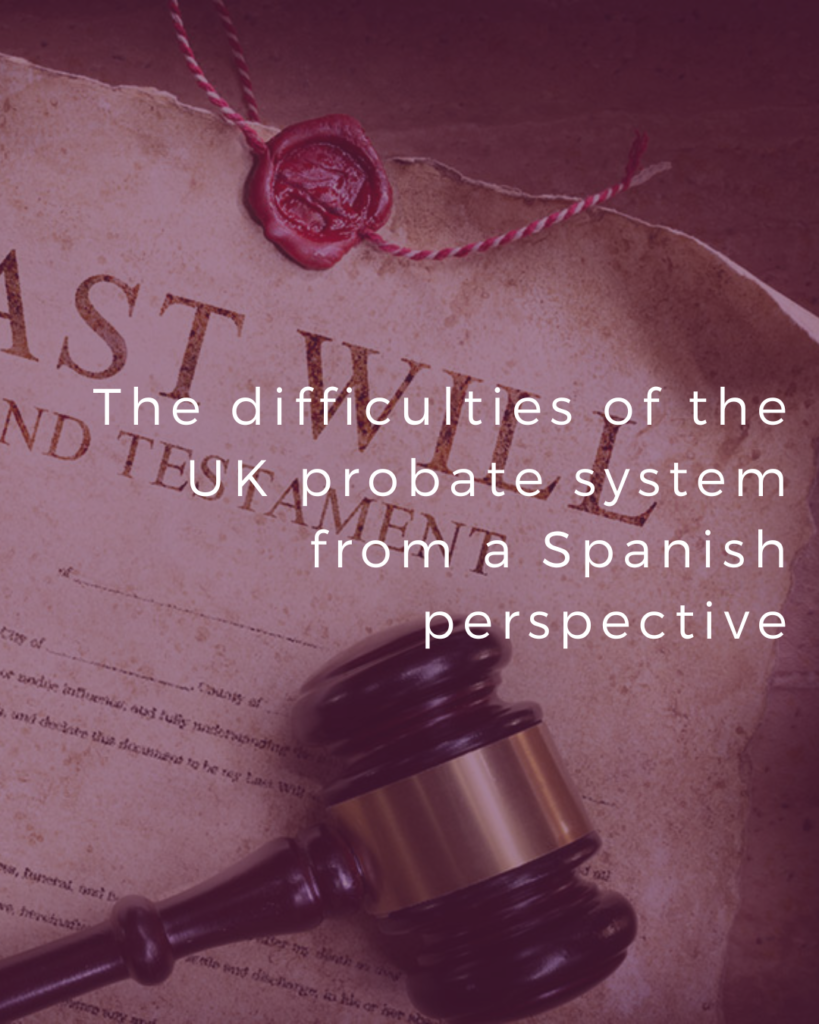Guide to dealing with probate. Dealing with probate after the death of a loved one has never been an easy procedure. Covid-19 has made it more challenging and the need of making personal arrangements in some cases has led to an even lengthier process than before. Meanwhile, the new government measures for amending the Wills Act 1837 are very welcomed to allow people during the pandemic to make a Video Will without the necessity of the witnesses being physically present. We ask some measures to be taken facilitating the issuance of Probates to be expedited quicker to the executors of a Will.
What you need to know if you have to apply for probate:
The Grant of probate is the Court’s recognition that the will is valid and this confirms that the executors have the right to administer the estate of the person who has passed away.
If you have been named as an executor to a will, you will have to apply for a grant of probate but you also can appoint a legal professional practitioner to represent you in such an application. if none survives at the date of the Testator’s death, applying for letters of administration with the will annexed will be necessary. The executor will have the legal right to administer the ‘estate’ (property, money and possessions) as well as paying all debts.
If the estate falls into the inheritance tax (IHT) bracket, any properties belonging to the deceased will have to be valued. Any outstanding income tax returns will need completion before IHT is submitted.
There is normally no tax to pay if the value of the estate is below the £325,000 threshold (£625,000 for a couple).
Tip:
- As an executor of a will, make sure that you talk to the testator (the person who has written the will) about where their original will and any other important documents are kept.
There are certain duties and responsibilities that an executor has to fulfil by law. These include making sure that the assets are valued and distributed to beneficiaries in accordance with the dispositions of the Will. Also you will have to make sure that you do not distribute the assets before paying the estate debts including of course, the funeral expenses. So it is very important that you prepare estate accounts to you being accountable before the beneficiaries and creditors.
Tip:
- As an executor you should record in detail every financial transaction relating to the estate during the administration so that you can answer any questions about how you administered the estate if required.
Probate usually takes anywhere between one to two months, however the UK government’s website is warning that because of coronavirus, probate applications are taking longer than usual to process.
Tip:
- Record the date when any papers were submitted as well as when any phone calls were made when chasing the solicitors or authorities involved, and always scan or print off copies of any documents for your own files.
Make sure you have several copies of the death certificate. Almost everyone you deal with will want to see one. In most cases, this will need to be an official copy (provided by the Registrar of Births, Marriages and Deaths). Also if you are an executor dealing with properties abroad, make sure that you translate into the official language and legalise your document including the Hague Apostille at the back of it.
Tip:
- The registrer should offer to fill in a form for the government’s Tell Us Once, a free government service that allows you to report a death that will go to all government departments with one call or email.
An executor should find out how much the deceased owed or was due from the Department for Work and Pensions (DWP) and when payments were made.
Tip:
- The Death Notification Service was set up by trade association UK Finance in conjunction with major banks which notifies government departments and financial institutions.
The deadline for any payment of inheritance tax due is six months from the end of the month of death, but due to the pandemic the Revenue has stated that it will permit late filing of the Inheritance Tax Account without penalty where they consider there to be a ‘reasonable excuse’.
If you, as the executor, feel able to deal with the probate process and if the money left behind was not enough to trigger the IHT threshold, then you could do so without incurring solicitor’s fees.
Tip:
- Compare quotes if you are shopping around for a probate specialist and use these to negotiate a cheaper fee
As soon as possible after the death, steps should be taken to ensure that the deceased’s assets are protected and insured. If a property is empty, make sure that is not obvious and that valuable assets have been removed.
Valuing assets can be a costly process and sometimes it can be a good idea to challenge the cost of the valuation report. For assets such as property or land, you should get a professional valuation. HM Revenue and Customs recommend having items over £500 professionally valued.
Del Canto Chambers is specialised in drafting AngloSpanish Wills and acting as personal representatives in complex estate planning. We represent and act as executors in the distribution of assets in Spain and in the UK, as well as provide International Tax advice in different countries.
Julio Prieto. Registered European Lawyer – Abogado
Contact Us
Del Canto Chambers is a leading London Chambers specialising in intellectual property, tax, international tax and legal affairs, property law and legal advocacy.
If you would like to speak to an expert about registering or protecting a trademark, please ring us.
To make a no-obligation enquiry, please either call us now on:
+44 2070 430648 or Make An Online Enquiry.







